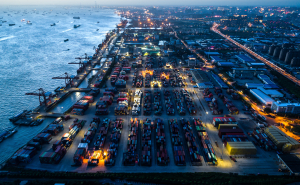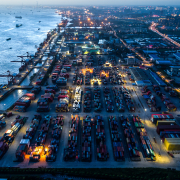Thanks to the coronavirus, the world has been upside down since March 2020. The effects can still be felt strongly in spring 2022, and there is no end in sight. Rather, the opposite is the case. In addition, there are significant effects of the war in Ukraine, which are also impacting the transport industry.
We would like to give you another update on the tense market situation and revise on our reports from the previous year.
Situation around the world:
Since February 24, 2022, a war has been waged between Russia and Ukraine. The effects are strongly felt around the world. Especially due to the extreme increase in oil and fuel prices, transport costs have risen enormously. Various surcharges have to be paid and passed on by freight forwarders and transport companies.
The transit times for air freight are in some cases considerably longer, also due to the airspace closures over Russia. In addition, freight capacities are severely reduced due to the high volume of cargo and the pandemic. Furthermore, a shortage of raw materials everywhere is driving up prices for wooden pallets, dunnage, and other packaging, for example.
Another major coronavirus outbreak in Shanghai is being fought by the Chinese government with a strict lock-down. The whole city of Shanghai has therefore been under curfew since the end of March. As a result, transport capacities at the ports and airports have been cut way down; at the same time, factories in Shanghai and the surrounding area have had to shut down most of their operations. Work can only be resumed slowly here. Many ships have not called Shanghai for recent weeks or are still lying in the roads outside the ports. This is leading to enormous port congestion. The result is further worldwide bottlenecks. For example, many empty containers are currently no longer available to the market, causing further reduction of transport options.
Air traffic has also been significantly affected and temporary closures of the Shanghai and Beijing airports have caused major backlogs as well.
The situation at US ports also remains unchanged. A large proportion of US ports are completely congested and ships must wait several weeks in some cases to be discharged. This is hampering American imports and exports equally. Vessels are severely delayed in arriving from the US to Europe or Asia, which throws the schedule there into disarray as well. In addition, onward transportation domestically faces further major challenges, as a lack of truckers delays the on- carriage and empty containers are delayed.

Impact on the transport market in Germany:
Because the factors in the transport world correlate with each other, the consequences are unfortunately also felt in the German transport market. Thus, ship delays in Asia and the US also mean delays in Germany and Europe. If ships depart too late in Asia, this also influences the schedules in Europe. Ships must deal with long waiting times in order to be able to berth at the terminals. Due to the many delays and the high freight volumes, the ports are extremely busy and overcrowded. As a result, goods for export may be delivered only at very short notice, sometimes as little as 48 hours before they are scheduled to be packed. Containers even have to be temporarily stored outside the port for an extra fee, if a lead time cannot be rescheduled when the delivery window changes. Nevertheless, very long waiting times are happening at the terminals and packing stations, which causes high demurrage charges. If schedules are then changed at short notice and departures are brought forward if necessary, goods can even miss the scheduled departures.
Storage areas in the ports are almost full and complicate the entire logistic chains. Overcrowded storage areas at the terminals means the distances to be covered by the port workers are much longer and the same work takes more time. Russian goods stranded by the sanctions also block capacities at the terminals. Everywhere, the high COVID19 case numbers are leading to increased staff absences and thus reduced productivity. Ports are unable to cope with the handling of the vessels. As a result, many vessels are currently anchored in the North Sea. Hamburg and Rotterdam are particularly affected.
The result is a shortage of empty containers for future shipments.
This is one of the reasons why there is a lack of empty equipment in the inland depots. Seaport round trips are therefore almost obligatory and make transport even more expensive.
In addition to standard containers, reefer containers are also particularly affected. This special equipment is almost unavailable and the necessary connections in the port are occupied by delayed containers. As a result, booking for export to Asia, for example, is almost impossible. Shipowners are simply refusing these bookings.
Freight rates remain at a very high level. Only exports to Asia are currently stagnating. Shipowners are justifying the enormous increases with the strong demand and the high cost increases due to the problems listed previously. However, the tremendous profits of the shipowners make these justifications appear questionable. Even high priority surcharges offered do not necessarily guarantee a slot on the booked departure.
Another link in the transport chain are the packing sheds and warehouses. Here, the situation is also becoming more challenging. Storage areas are exhausted, so goods can only be accepted shortly before the planned stowage or must be stored temporarily at another location, for example at the truck companies, for an additional fee. Loading and unloading planned at short notice is almost impossible. Staff is in short supply and absences related to COVID19 can quickly lead to long delays.
Furthermore, pre- and onward carriage by truck in Germany and Europe are also affected by the difficulties. The high volume of freight, the lack of truck drivers and rising fuel prices are increasing both transit times and costs. A considerable proportion of truck drivers come from Ukraine, so their absence further exacerbates the driver shortage. It is nearly impossible to predict the changes in fuel prices in the longer term. Therefore, transport prices are valid only in the short term. Based on the constantly high demand, these factors make planning transports even more difficult.
The high demand for transport and the lack of reliability in sea freight also have a strong impact on air freight. At the beginning of the pandemic, air traffic was drastically reduced, resulting in an extreme shortage of space on aircraft. Air freight became increasingly unreliable and freight rates rose massive as well. In the meantime, significantly more aircraft are in service again and airlines are also ordering long-haul aircraft again. However, it is still a long way from a return to longer-haul and cheaper air freight rates. In addition, originally planned sea freight is increasingly being switched to air freight due to the above-mentioned reasons, which also reduces capacities.

Conclusion:
In conclusion, the situation remains very tense and logistics will continue to be challenged by the existing capacity bottlenecks.
Since many factors go hand in hand, the constantly high demand will continue to ensure a high utilization of the means of transport in the future. As a result, longer transit times and a decline in planning reliability must be expected in the future as well, despite the higher logistical effort. The organizational effort and costs will remain continuously high.
The current political situation in Europe increases the pressure, as does the uncertain development of the COVID19 pandemic. In particular, the zero-covid strategy in China is causing further uncertainty.
Therefore, we can unfortunately only repeat that Interfracht has no influence on the development of the market and we can only give an overview of the situation.
At the same time, we see it as our duty to continue to assist our customers with all our knowledge and skills, especially in these uncertain times. Our employees are committed every day to achieve the best possible transport solutions for our customers. If you have any questions, please do not hesitate to contact us.

















